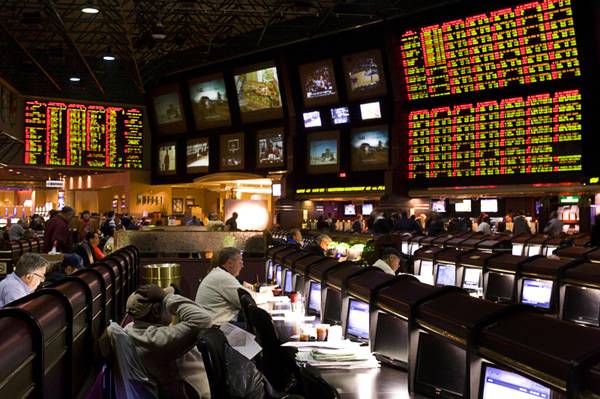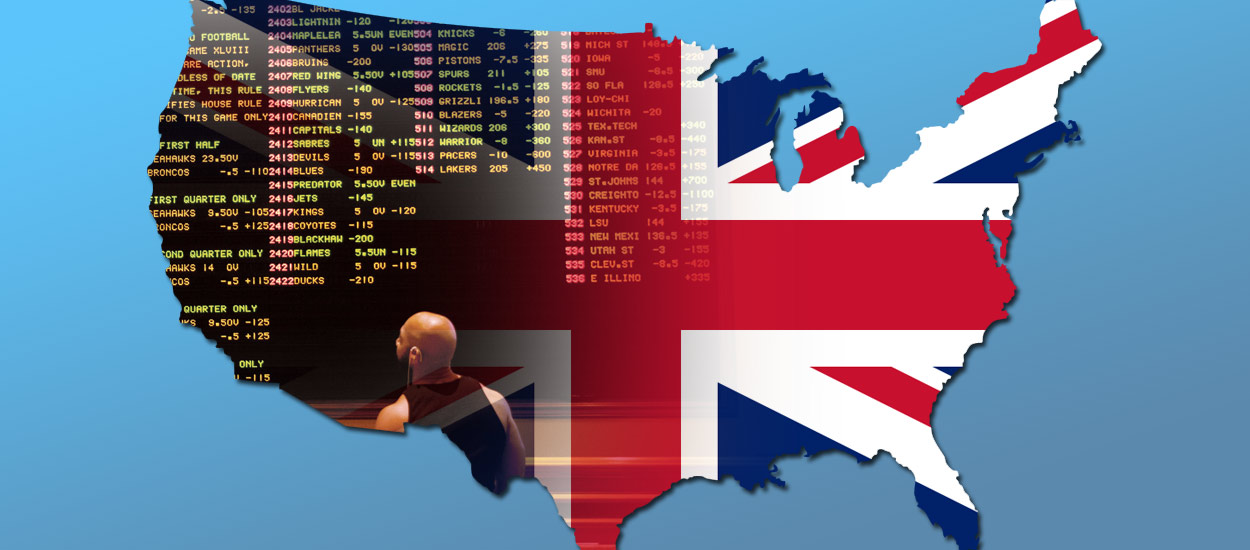Sports betting in the United States is targeted by British bookmakers
When it was announced that British bookmaker William Hill was purchasing Lucky's and Leroy's sportsbooks (along with Club Cal Neva) around 2013, a Las Vegas professional sports bettor told me that if things went as expected he may have to give up the profession.
"These are the two best sportsbooks in the business," he emailed me at the time, "and I am more than frustrated. I know when I go to Leroy's, I'll be getting the best lines, that they take huge action and don’t turn away wiseguys. And that they are willing to take a hit. But everything I’ve heard about the British model is different. They are known for low limits, changing the line quickly, kicking out winners and worst of all terrible lines. If I am forced to bet a 20 or 30 cent line on baseball or a 30 or 40 cent line on football or basketball I may as well take my winnings to date and get a new profession. You just can't win with those lines, especially if the betting limits are low."
The professional gambler's sentiments were echoed by many others. Surprisingly, when William Hill first started taking bets in Nevada the lines were more or less the same as Leroy's, Lucky's and other bookmakers like Westgate. But according to sources in Las Vegas, over the last few years those holds indeed started creeping up and the limits for winning bettors started to decline. It became even more pronounced after the Professional and Amateur Sports Protection Act (PASPA). William Hill, of course, was not the only British company to move into the U.S. market. U.K betting exchange, Betfair, first purchased TVG in anticipation of licensed and regulated U.S. sports betting and when that happened, the company also bought out Stars Group and FanDuel under the name Flutter Entertainment. FanDuel almost immediately became the biggest name in sports betting in New Jersey and Pennsylvania and it appears they will be one of the largest sports betting companies, along with DraftKings, throughout the United States. 888 Gaming has also used their partnership with Caesars to create 888 Sports in New Jersey. Ladbrokes-Coral is the only large British sportsbook not to venture into the United States, although there are rumors that they are actively looking at partnering or acquiring a U.S. casino company to offer sports betting, if the economics make sense.
William Hill, of course, was not the only British company to move into the U.S. market. U.K betting exchange, Betfair, first purchased TVG in anticipation of licensed and regulated U.S. sports betting and when that happened, the company also bought out Stars Group and FanDuel under the name Flutter Entertainment. FanDuel almost immediately became the biggest name in sports betting in New Jersey and Pennsylvania and it appears they will be one of the largest sports betting companies, along with DraftKings, throughout the United States. 888 Gaming has also used their partnership with Caesars to create 888 Sports in New Jersey. Ladbrokes-Coral is the only large British sportsbook not to venture into the United States, although there are rumors that they are actively looking at partnering or acquiring a U.S. casino company to offer sports betting, if the economics make sense.
I asked Fred Hynes, a colleague located in Trenton, New Jersey who used to bet offshore and I've quoted before in articles, if the lines at the New Jersey sportsbooks were good.
"They are typical, but I miss the good old days of low juice offshore and personal relationships."
Fred of course was referring to the early to mid 2000s, prior to the passing of the UIGEA, when sportsbooks were in competition with each other and would offer extremely low juice, great sign-up and reload bonuses and other promotions to get a player's business. The general feeling was “whatever it takes to get your business" and this included a personal relationship with the book itself.
Names like Henry, Haden and Spiro were known to all and when a player mentioned their name everyone knew exactly who was being referred to and which book. That relationship also had some perks as many times with familiarity a player could get higher limits, slightly lower juice or other incentives just for the asking. Those books pretty much all either sold to British companies like WWTS did, cut off the U.S. market, such as Pinnacle Sports or simply closed shop like The Greek and WSEX. And most recently 5 Dimes left the U.S. market although they insist that they will be back. But now sports bettors wagering at regulated U.S. sportsbooks have no relationship with the books and are just another name in a company's database or a number on a rewards card.
Because of the success of William Hill in Nevada, Caesars recently purchased William Hill for £2.9 billion, (they previously only owned 20%). It is expected Caesars will operate the sportsbooks in the U.S., maintaining the current William Hill staff and bookmakers as consultants and will sell the non-U.S. operations to a different company. I was curious what made the company worth so much and asked a gaming analyst familiarity with both the British and U.S. sports betting markets, how they could justify the price. The gaming analyst told me that the new model and the takeover by Britain makes the industry more viable. According to the analyst, Caesars viewed sports betting as a loss leader in Las Vegas but with the British model it will be profitable. According to the analyst the British philosophy towards sports betting is to entice bettors with promotions and incentives, but to never offer lines that could result in a losing book. That generally means a 40-cent line on European or Asian sports and a 30-cent line on North American sports. The hold on futures in British books is also much higher than traditionally in Las Vegas and there is also far more of a push towards high profit sports like horse racing and golf.
The gaming analyst told me that the new model and the takeover by Britain makes the industry more viable. According to the analyst, Caesars viewed sports betting as a loss leader in Las Vegas but with the British model it will be profitable. According to the analyst the British philosophy towards sports betting is to entice bettors with promotions and incentives, but to never offer lines that could result in a losing book. That generally means a 40-cent line on European or Asian sports and a 30-cent line on North American sports. The hold on futures in British books is also much higher than traditionally in Las Vegas and there is also far more of a push towards high profit sports like horse racing and golf.
When asked how the British philosophy on sports betting will help one sportsbook get customers over another, the analyst replied that the books in the UK just aren't as competitive and they know that customers who are happy will continue playing with them, noting that building trust and loyalty is essential. In a way British books consider each other more as partners than competitors and work together to help lay off action and also set lines that will allow all to be profitable.
Caesars will almost certainly integrate the William Hill lines and sportsbooks into Caesars Palace, Harrah’s, Flamingo and Bally's which will be deemed unfortunate by Vegas regulars, since many professionals consider Caesars Palace and Harrah's in particular as the places to get great lines and good variety of betting options.
So, the American sports betting industry is becoming very British and it would not be surprising to see all land-based sportsbooks in the United States owned and operated by a British company. And offshore many of the great companies are selling out or closing shop because they just can't compete with licensed and regulated sports betting, not to mention fighting off efforts by the DoJ to shut them down by threatening arrests and cutting off all their payment options. And unfortunately for American bettors, this lack of options will lead to worse lines than traditionally offered and the loss of the relationships many bettors developed with their bookmakers. It was easy to see this coming from a mile away when SCOTUS repealed PASPA, but it doesn't make it easier.
Read insights from Hartley Henderson every week here at OSGA and check out Hartley's RUMOR MILL!







































